Toronto/Windsor
Moderator: Capos
Re: Toronto/Windsor
Looking at Toronto's history, the two major compaesani groups during the development of its Sicilian colony were from Termini Imerese and Vita. The Termitani as expected were upper class Palermitan businessmen and had high credit ratings which gave them an economic advantage in the area. Many of the Vitesi ended up selling their businesses to Termitani.
As we know from other cities, Termini played a quiet but pivotal role in the development of Cosa Nostra in the US and Vita was no slouch either. We can see mafiosi from Salemi and Vita in Toronto later but I suspect there were early mafiosi from Termini there as well.
As we know from other cities, Termini played a quiet but pivotal role in the development of Cosa Nostra in the US and Vita was no slouch either. We can see mafiosi from Salemi and Vita in Toronto later but I suspect there were early mafiosi from Termini there as well.
Re: Toronto/Windsor
^^^^
Did you rely on an online version of John Zucchi's 1988 book, Italians in Toronto: development of a national identity, 1875-1935?, or on other sources?
The book argues that the pachinesi, termitani, and vitesi in Toronto, many of whom were fruiterers, were reluctant to sell their businesses, with changes in ownership being quite infrequent. (p. 97) Within each group, the rate of endogamy was quite high, but there were also numerous contracted marriages between individuals from those three groups. (p. 63)
The book also indicated that the termitani who were fruiterers in Cleveland would rather, along with their townspeople, leave the city because the Black Hand controlled the fruit trade. (p. 98) The associated footnote (no. 48) starts off as follows: "Apparently the Black Hand or 'Banana Society' problem among Sicilians, especially those from Termini Imerese, was serious in various cities in Ohio and Pennsylvania." (p. 211)
Ephemera: "Beginning in New Orleans in the 1860s, the termitani developed networks in most major cities on the continent and in many minor ones. The Chicago colony was the largest and the townsgroup in Toronto was, in fact, very much a derivative of the former." (p. 30)
Did you rely on an online version of John Zucchi's 1988 book, Italians in Toronto: development of a national identity, 1875-1935?, or on other sources?
The book argues that the pachinesi, termitani, and vitesi in Toronto, many of whom were fruiterers, were reluctant to sell their businesses, with changes in ownership being quite infrequent. (p. 97) Within each group, the rate of endogamy was quite high, but there were also numerous contracted marriages between individuals from those three groups. (p. 63)
The book also indicated that the termitani who were fruiterers in Cleveland would rather, along with their townspeople, leave the city because the Black Hand controlled the fruit trade. (p. 98) The associated footnote (no. 48) starts off as follows: "Apparently the Black Hand or 'Banana Society' problem among Sicilians, especially those from Termini Imerese, was serious in various cities in Ohio and Pennsylvania." (p. 211)
Ephemera: "Beginning in New Orleans in the 1860s, the termitani developed networks in most major cities on the continent and in many minor ones. The Chicago colony was the largest and the townsgroup in Toronto was, in fact, very much a derivative of the former." (p. 30)
Re: Toronto/Windsor
Yep, that's the book.
Here is where it mentions stores being sold among Italians / Sicilians and especially the Vitesi selling to Termitani:

Here is where it mentions stores being sold among Italians / Sicilians and especially the Vitesi selling to Termitani:

Re: Toronto/Windsor
But if the termitani, vitesi, and pachinesi are intermarrying, as well as selling their businesses to one another, I'm not seeing the superiority of one group over another. Do you see the termitani in Toronto as garnering the most respect between those three groups?
Re: Toronto/Windsor
Didn't say or see anything about the Termitani being superior, only that they (as in other cities) were often from the upper classes and had economic advantages. They were an extremely resourceful compaesani group in Sicily as well as North America, both legitimately and in early underworld circles (which sometimes intersected).
Re: Toronto/Windsor
Ah, okay. Having interacted in the Greater Toronto Area with many pachinesi and termitani in Italian-Canadian and Sicilian-Canadian cultural and business-professional organizations, I haven't encountered individuals with ancestry from either comune expressing contempt for the other group or for Sicilians with provenance from elsewhere, nor have I witnessed individuals putting on airs because of their particular ancestry. An antimafia stance comes through loud and clear from everyone I've met.
Below is part of what Lee Lamothe posted back on Dec. 1, 2006, 1:17 am, on Rick Porrello's old crime forum on AmericanMafia.com. Lamothe is referring to the Project Colisée bust that happened 9 days earlier.
The thirty in Toronto weren't touched by the Montreal project yet. The "crews" are actually relationships bound either by blood and marriage -- in the case of the Cammileris -- or by drug trafficking associations -- in the case of the Genua/Arcuris. In spite of what's been said recently in the media Toronto does have at least four Sicilian cells -- there seems to be a great effort on the part of people -- including so-called journalists -- to suggest Toronto isn't up to the task. Actually the Toronto Sicilians -- many of them from Trapani and Cattolica -- were deeply into the French and Pizza Connection cases and these guys are still around and are, I can tell you, tough old bastards.
Original link (no longer operational, nor archived on Wayback Machine): http://cybermessageboard.fatcow.com/rpo ... .php?t=155
Given that Lamothe was such a mob groupie and was obsessed with determining a criminal's formal mafia affilation -- this was before he started tending more and more to his wheelchair-bound wife, who was also a journalist -- I wonder whether today he would admit or clarify that individuals like Giacinto Arcuri, Peter Scarcella, and Antonino Cammalleri were "freelancers," as Anna Sergi was told in the last year by law enforcement here in Canada. One of my interpretations of this term "freelancer" -- maybe posters can reach out to her for her take -- is that 1. there have been Italian-Canadians in the Greater Toronto Area who have indicated they are part of the mafia when in fact they aren't (this behaviour is possible in Quebec too); and 2. law-enforcement agencies, true-crime writers, and organized-crime reporters have sometimes asserted that individuals are in the mafia who are not.
The relationships that individuals like Arcuri, Scarcella, and Cammalleri had to actual mafia members need to be carefully scrutinized but not embellished for the purpose of ascribing mafia membership to the former as well. In the case of Scarcella, you also have to look at how he seemed at times to be collaborating more often with the GTA-based Commissos of the Siderno Group than with Sicilian-Canadians or Sicilians in Ontario and Quebec.
Below is part of what Lee Lamothe posted back on Dec. 1, 2006, 1:17 am, on Rick Porrello's old crime forum on AmericanMafia.com. Lamothe is referring to the Project Colisée bust that happened 9 days earlier.
The thirty in Toronto weren't touched by the Montreal project yet. The "crews" are actually relationships bound either by blood and marriage -- in the case of the Cammileris -- or by drug trafficking associations -- in the case of the Genua/Arcuris. In spite of what's been said recently in the media Toronto does have at least four Sicilian cells -- there seems to be a great effort on the part of people -- including so-called journalists -- to suggest Toronto isn't up to the task. Actually the Toronto Sicilians -- many of them from Trapani and Cattolica -- were deeply into the French and Pizza Connection cases and these guys are still around and are, I can tell you, tough old bastards.
Original link (no longer operational, nor archived on Wayback Machine): http://cybermessageboard.fatcow.com/rpo ... .php?t=155
Given that Lamothe was such a mob groupie and was obsessed with determining a criminal's formal mafia affilation -- this was before he started tending more and more to his wheelchair-bound wife, who was also a journalist -- I wonder whether today he would admit or clarify that individuals like Giacinto Arcuri, Peter Scarcella, and Antonino Cammalleri were "freelancers," as Anna Sergi was told in the last year by law enforcement here in Canada. One of my interpretations of this term "freelancer" -- maybe posters can reach out to her for her take -- is that 1. there have been Italian-Canadians in the Greater Toronto Area who have indicated they are part of the mafia when in fact they aren't (this behaviour is possible in Quebec too); and 2. law-enforcement agencies, true-crime writers, and organized-crime reporters have sometimes asserted that individuals are in the mafia who are not.
The relationships that individuals like Arcuri, Scarcella, and Cammalleri had to actual mafia members need to be carefully scrutinized but not embellished for the purpose of ascribing mafia membership to the former as well. In the case of Scarcella, you also have to look at how he seemed at times to be collaborating more often with the GTA-based Commissos of the Siderno Group than with Sicilian-Canadians or Sicilians in Ontario and Quebec.
Re: Toronto/Windsor
Is he a "mob groupie"? I'm not familiar enough with his personality and I myself am obsessed with determining the formal affiliation of a given mafioso because that's a core part of what makes them who and what they are.
The individuals you mentioned are at least part of the mafia network and have been identified as mafia affiliates of some kind, Canada being lacking in terms of inside sources who have publicly clarified the finer details. It's common for members or associates of a given group to associate with a wide array of individuals who don't always share the same affiliation, there being no rule against it and it being a near-necessity to do so as an "active" underworld figure. They also associate with individauls and groups outside of the mafia network.
It's smart when covering this subject to avoid identifying someone as a made member when we lack confirmation but it's also easy to make the opposite mistake and assign terms like "independent" and "freelancer" to them based on a superficial understanding of what mafia affiliation is. We lack evidence as to whether certain people in Canada are made or which group they are formally "with" but I'm not sure what proof there is that these individuals are "freelancers" who exist independent of the mafia system that surrounds them. From what's publicly available, Canadian LE tends to assign their own classifications that are at times at odds with the formalities internal to the underworld (i.e. charts showing the "Luppino-Violi Crime Family" despite the Luppinos and Violis being made members and leaders of the Buffalo Family).
The individuals you mentioned are at least part of the mafia network and have been identified as mafia affiliates of some kind, Canada being lacking in terms of inside sources who have publicly clarified the finer details. It's common for members or associates of a given group to associate with a wide array of individuals who don't always share the same affiliation, there being no rule against it and it being a near-necessity to do so as an "active" underworld figure. They also associate with individauls and groups outside of the mafia network.
It's smart when covering this subject to avoid identifying someone as a made member when we lack confirmation but it's also easy to make the opposite mistake and assign terms like "independent" and "freelancer" to them based on a superficial understanding of what mafia affiliation is. We lack evidence as to whether certain people in Canada are made or which group they are formally "with" but I'm not sure what proof there is that these individuals are "freelancers" who exist independent of the mafia system that surrounds them. From what's publicly available, Canadian LE tends to assign their own classifications that are at times at odds with the formalities internal to the underworld (i.e. charts showing the "Luppino-Violi Crime Family" despite the Luppinos and Violis being made members and leaders of the Buffalo Family).
-
CabriniGreen
- Full Patched
- Posts: 3154
- Joined: Thu Jul 06, 2017 6:09 am
Re: Toronto/Windsor
When determining a potential mobsters affiliation, and his standing in the "rackets" or underworld of a given territory, B. You might remember my criteria for analysis I send you in a PM.... I apply it equally to guys I've never heard of...B. wrote: ↑Sat Jul 01, 2023 12:23 am Is he a "mob groupie"? I'm not familiar enough with his personality and I myself am obsessed with determining the formal affiliation of a given mafioso because that's a core part of what makes them who and what they are.
The individuals you mentioned are at least part of the mafia network and have been identified as mafia affiliates of some kind, Canada being lacking in terms of inside sources who have publicly clarified the finer details. It's common for members or associates of a given group to associate with a wide array of individuals who don't always share the same affiliation, there being no rule against it and it being a near-necessity to do so as an "active" underworld figure. They also associate with individauls and groups outside of the mafia network.
It's smart when covering this subject to avoid identifying someone as a made member when we lack confirmation but it's also easy to make the opposite mistake and assign terms like "independent" and "freelancer" to them based on a superficial understanding of what mafia affiliation is. We lack evidence as to whether certain people in Canada are made or which group they are formally "with" but I'm not sure what proof there is that these individuals are "freelancers" who exist independent of the mafia system that surrounds them. From what's publicly available, Canadian LE tends to assign their own classifications that are at times at odds with the formalities internal to the underworld (i.e. charts showing the "Luppino-Violi Crime Family" despite the Luppinos and Violis being made members and leaders of the Buffalo Family).
( I see 3 ways Sicilian mafia has presence in the States. 1. A replica, a duplicate of the organizational structure, be it a family like the Caruanas in Venezuela, or a decina like Santa Nifa in Venezuela, or the Bonnanos in Montreal, Buffalo in Toronto, or the family in Brazil, or the Inzerillos in NY, exported to a foreign territory, that members can interface with. Does Gucciardi run a Sciacca family decina in NY?
2. There is no replica of the organizational structure in said territory, but possibly business and contacts to be exploited for ones' benefit on behalf of himself, and his organization. This would be Rosario. (This type is more like an operative of his family.) And maybe Gucciardi?
3. The Lombardo situation, where he fully relocates, seeks and receives a formal transfer/inducted into the American mafia. But still maintains kinship ties to the Old country.
)
Or is he operating as a sicilian mafia independent, under nominal Bonnano oversight, like Rosario was with the Gambinos, but still ultimately answerable to Diminio? Or did Gucciardi simply leave Sicily, make his way in NY, is fully on board with the Bonnanos, but still tied to Diminio via social/cultural ties, but not necessarily organizational?
I would apply this to guys like Scarcella....
-
CabriniGreen
- Full Patched
- Posts: 3154
- Joined: Thu Jul 06, 2017 6:09 am
Re: Toronto/Windsor
This is a highly interesting post. I just recently replied to a post by Stubbs, that the Sicilians are a network of families, not just rackets. That it's based on families from Catollica and Siculiana, and the primary economic activity was narcotics.antimafia wrote: ↑Fri Jun 30, 2023 9:52 am Ah, okay. Having interacted in the Greater Toronto Area with many pachinesi and termitani in Italian-Canadian and Sicilian-Canadian cultural and business-professional organizations, I haven't encountered individuals with ancestry from either comune expressing contempt for the other group or for Sicilians with provenance from elsewhere, nor have I witnessed individuals putting on airs because of their particular ancestry. An antimafia stance comes through loud and clear from everyone I've met.
Below is part of what Lee Lamothe posted back on Dec. 1, 2006, 1:17 am, on Rick Porrello's old crime forum on AmericanMafia.com. Lamothe is referring to the Project Colisée bust that happened 9 days earlier.
The thirty in Toronto weren't touched by the Montreal project yet. The "crews" are actually relationships bound either by blood and marriage -- in the case of the Cammileris -- or by drug trafficking associations -- in the case of the Genua/Arcuris. In spite of what's been said recently in the media Toronto does have at least four Sicilian cells -- there seems to be a great effort on the part of people -- including so-called journalists -- to suggest Toronto isn't up to the task. Actually the Toronto Sicilians -- many of them from Trapani and Cattolica -- were deeply into the French and Pizza Connection cases and these guys are still around and are, I can tell you, tough old bastards.
Original link (no longer operational, nor archived on Wayback Machine): http://cybermessageboard.fatcow.com/rpo ... .php?t=155
Given that Lamothe was such a mob groupie and was obsessed with determining a criminal's formal mafia affilation -- this was before he started tending more and more to his wheelchair-bound wife, who was also a journalist -- I wonder whether today he would admit or clarify that individuals like Giacinto Arcuri, Peter Scarcella, and Antonino Cammalleri were "freelancers," as Anna Sergi was told in the last year by law enforcement here in Canada. One of my interpretations of this term "freelancer" -- maybe posters can reach out to her for her take -- is that 1. there have been Italian-Canadians in the Greater Toronto Area who have indicated they are part of the mafia when in fact they aren't (this behaviour is possible in Quebec too); and 2. law-enforcement agencies, true-crime writers, and organized-crime reporters have sometimes asserted that individuals are in the mafia who are not.
The relationships that individuals like Arcuri, Scarcella, and Cammalleri had to actual mafia members need to be carefully scrutinized but not embellished for the purpose of ascribing mafia membership to the former as well. In the case of Scarcella, you also have to look at how he seemed at times to be collaborating more often with the GTA-based Commissos of the Siderno Group than with Sicilian-Canadians or Sicilians in Ontario and Quebec.
Also interesting these Toronto Sicilians. Caruana people? Rizzuto people? A combo of both? Are they extensions of an existing group in Sicily? Or do they just have origins in Sicily, but a wholly newly formed thing?
Sergi wrote a paper that B. went into a little on mafia hybridization and Mafia " Brands" being appropriated by Italian criminals in certain territories where no mafia group established an absence of competition. In fact I forget exactly all of her reasons for this type of criminal behavior, I gotta go back and read..
-
CabriniGreen
- Full Patched
- Posts: 3154
- Joined: Thu Jul 06, 2017 6:09 am
Re: Toronto/Windsor
It's never had an official Mafia Family, it's more like Rome or Eastern Sicily in that regard....motorfab wrote: ↑Wed Jan 12, 2022 9:50 am Yes, and Rocco Perri worked in the 1910's for Joe Musolino, whose cousin of the same name is a famous early member of the 'ndrangheta in Santo Stefano in Aspromonte. Joe Musolino was arrested in 1909 along with a few others for a murder case, and the guy who gave the case to the police described Musolino as a leader of a criminal secret society, and he later became deported to Italy around 1911 (or he escaped I'm not sure). Antonio Papalia also worked for Perri if I remember correctly
I'm not sure there's ever been a Cosa Nostra family in Toronto, but the city has often served as a refuge for runaway criminals or has zips to do drug business.
Among the fugitive guys are Leonardo Cammalleri (Vito Rizzuto's father-in-law) & Leonardo Salvo who fled Cattolica Eraclea to escape prosecution for the murder of Mayor Giuseppe Spagnolo. Or more recently Michele Modica of Bagheria who had a feud with Pietro Scarcella
Among the Sicilians involved in drug trafficking are Benedetto Zizzo (whose brother was the boss of the Salemi cosca in the province of Trapani), Francesco Belliti, Giuseppe Indelicato, Michele Vinci or Alfonso Caruana, etc ...
But Toronto and Ontario in general are more with Calabrian mafiosi or gangsters with the Siderno Group established from the 50's (Mike Racco, Zito, Deleo, Triumbari and the others), the Musitanos in Hamilton (with Angelo who was on the run for having killed his sister ...), the Silvestro, Bordonaro, Sorbara, Carere or Scibetta families in Guelph & Burlington ... Or Domenico Violi or Giacomo Luppino who emigrated to Ontario in the 40's and 50's
I find Ontario difficult enough to bring together all the criminal groups. That's pretty basics info/names but like I said, except for the 'ndrangheta/Siderno group, not sure there was ever a full fledged borgata in Ontario (for the Ontario's experts, don't hit me if I'm wrong, I'm rather on Québec history)
- motorfab
- Full Patched
- Posts: 2718
- Joined: Sat Aug 12, 2017 2:07 am
- Location: Grenoble, France
- Contact:
Re: Toronto/Windsor
Maybe I explained badly but more or less, its what I said. But it's not impossible that there was a borgata or Sicilians OC groups in the early XXth century either I think.
In Rome if I'm not mistaken I believe it was a decina of the Riesi cosca but no one was really in charge at some point
In Rome if I'm not mistaken I believe it was a decina of the Riesi cosca but no one was really in charge at some point
Re: Toronto/Windsor
Screenshots below are from a 2-page thread that starts at https://www.italiangenealogy.com/forum/topic/13415. Two posters mention relatives with ancestry from Termini Imerese moving from Chicago to, ultimately, Toronto, and other posters add to the discussion.
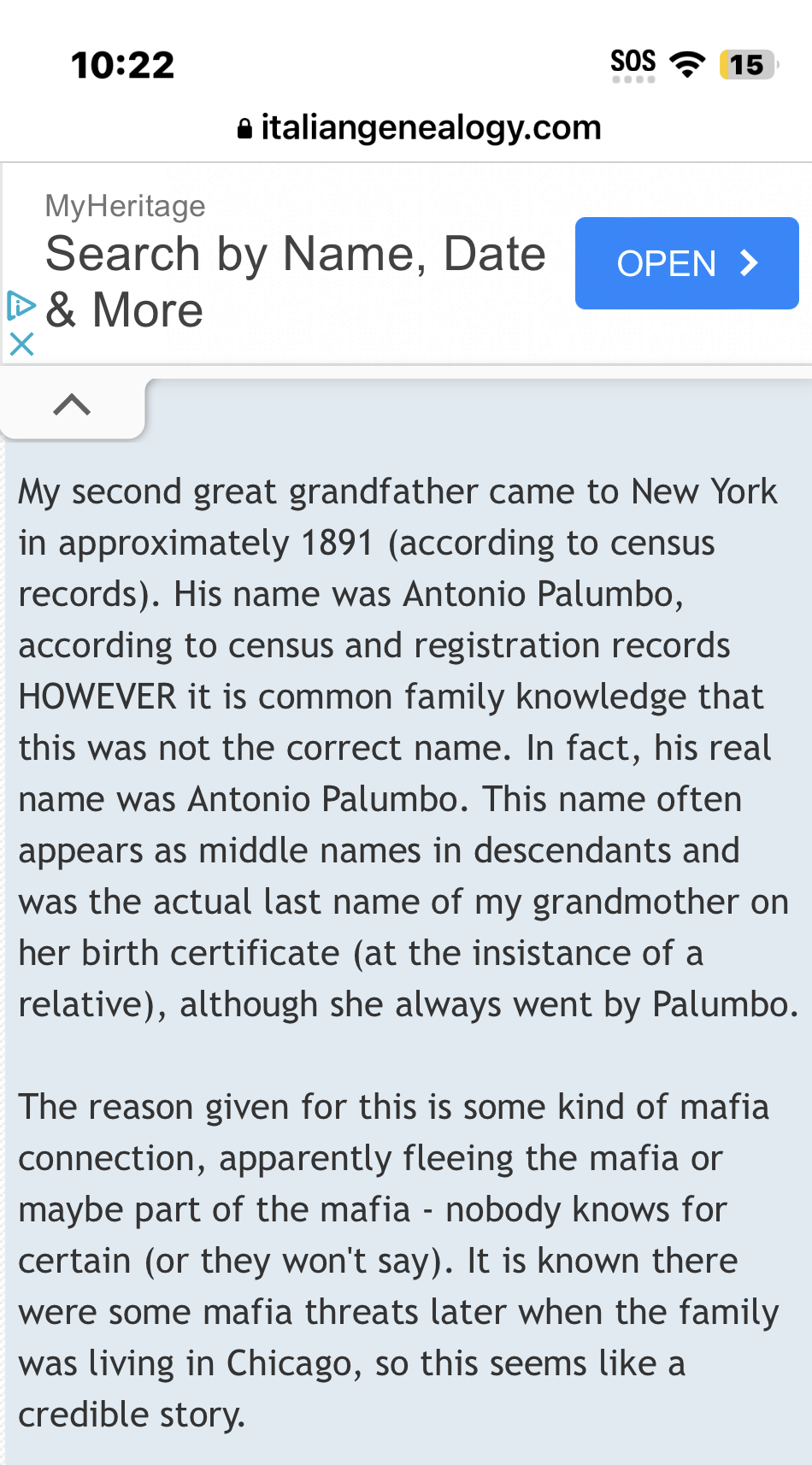
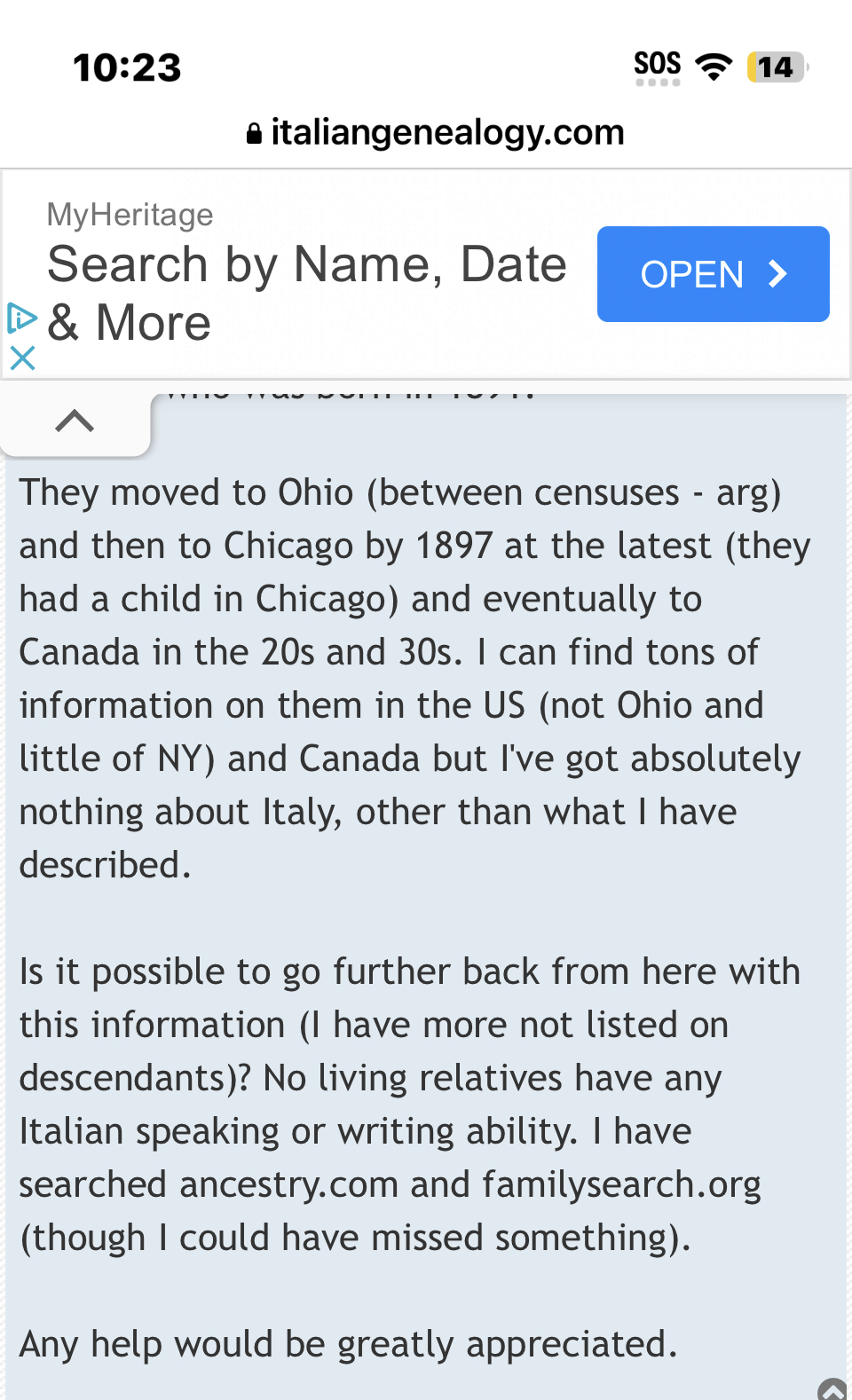
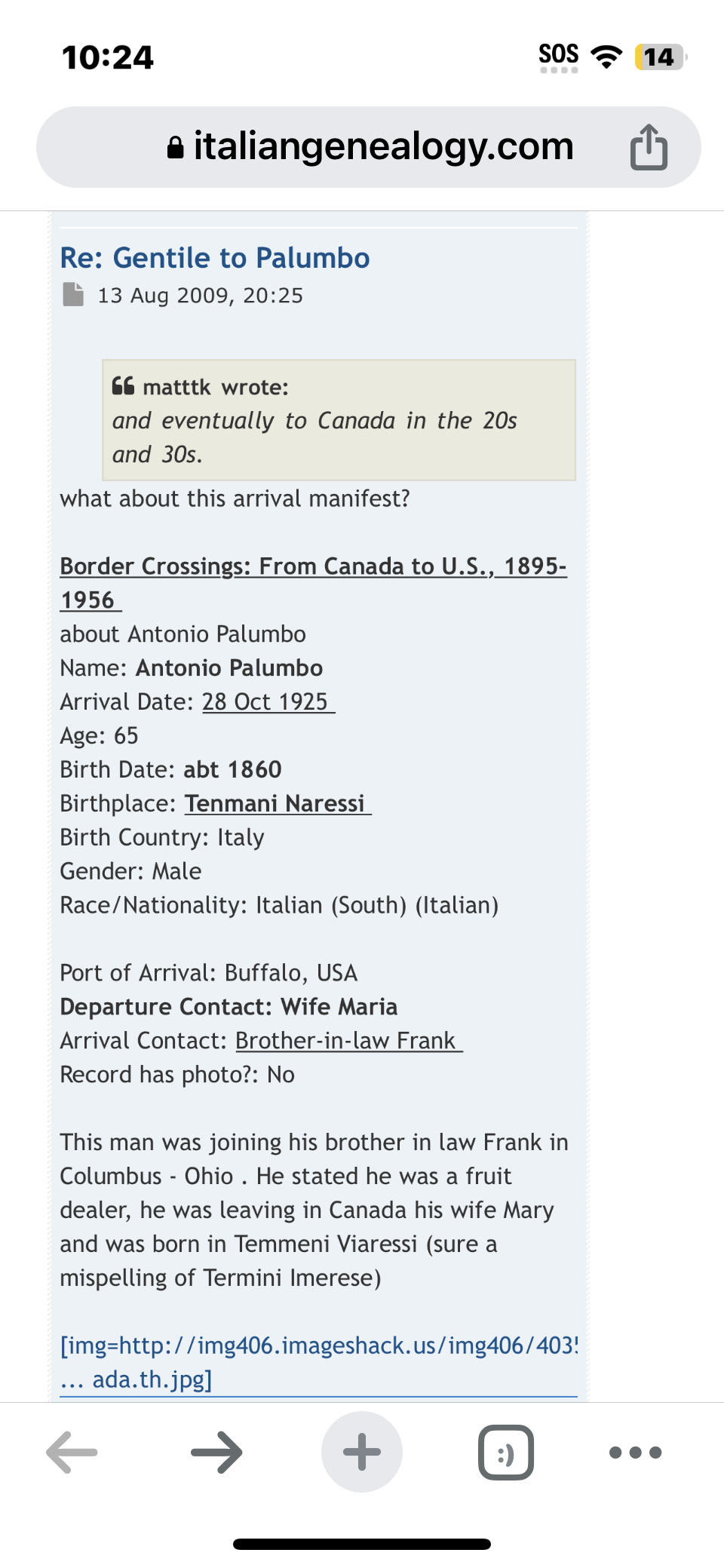
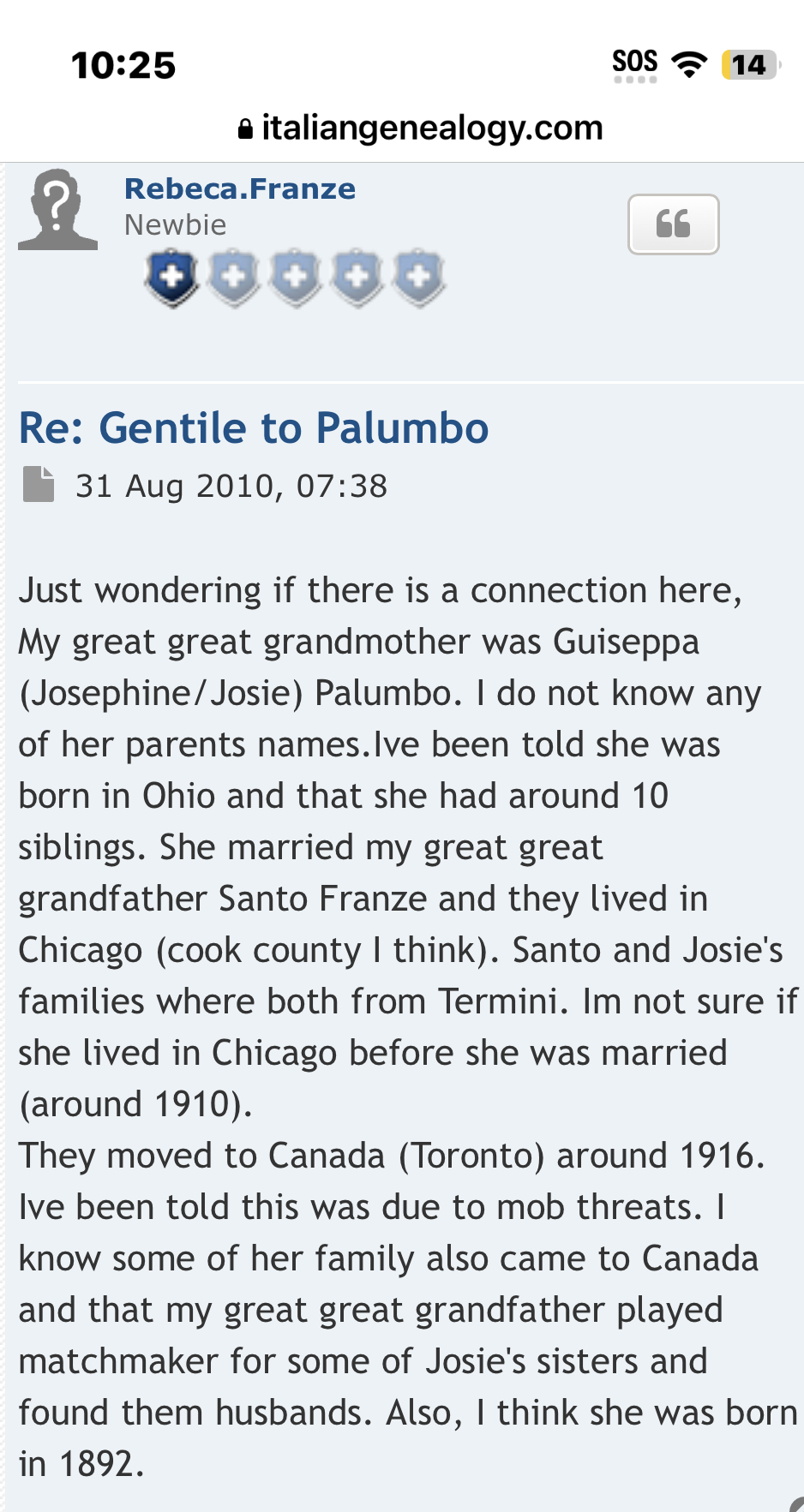
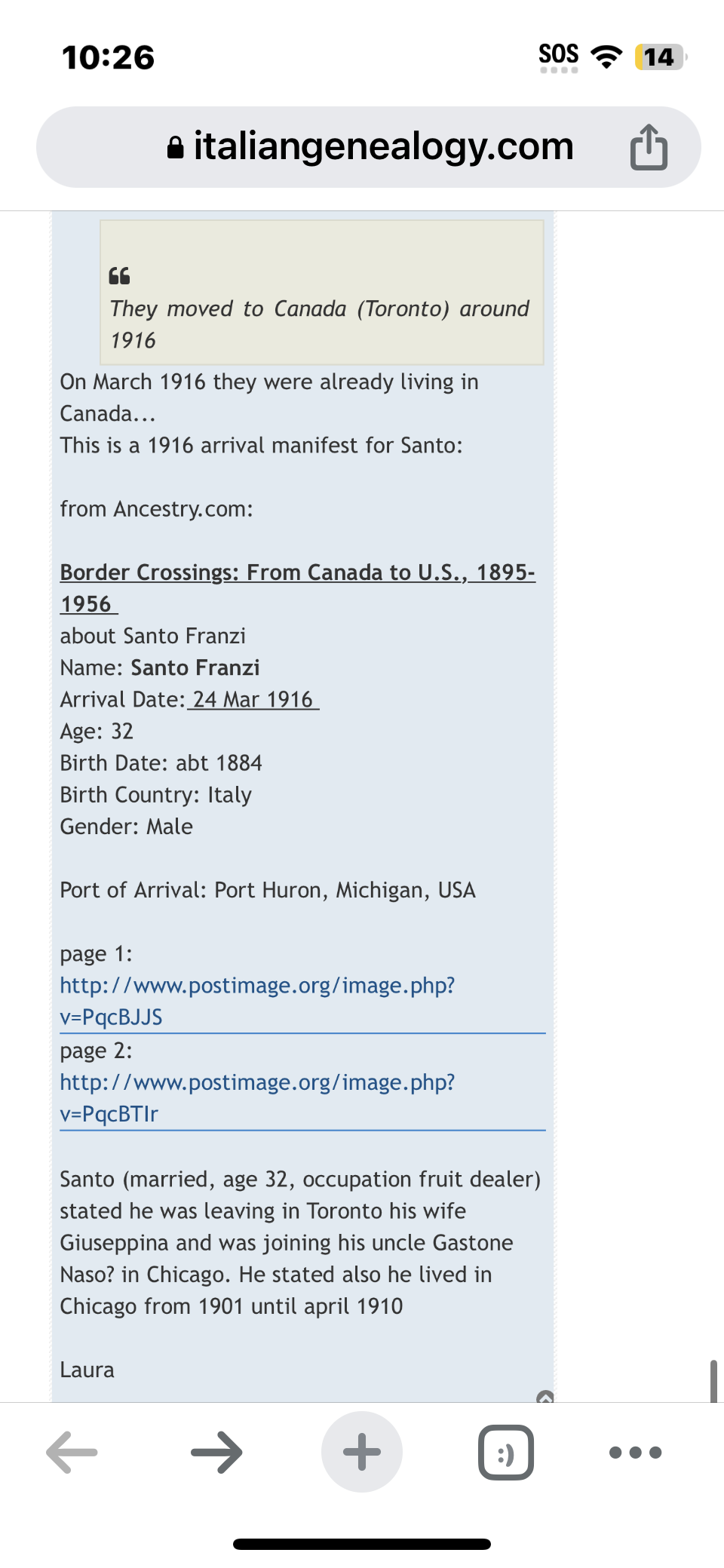
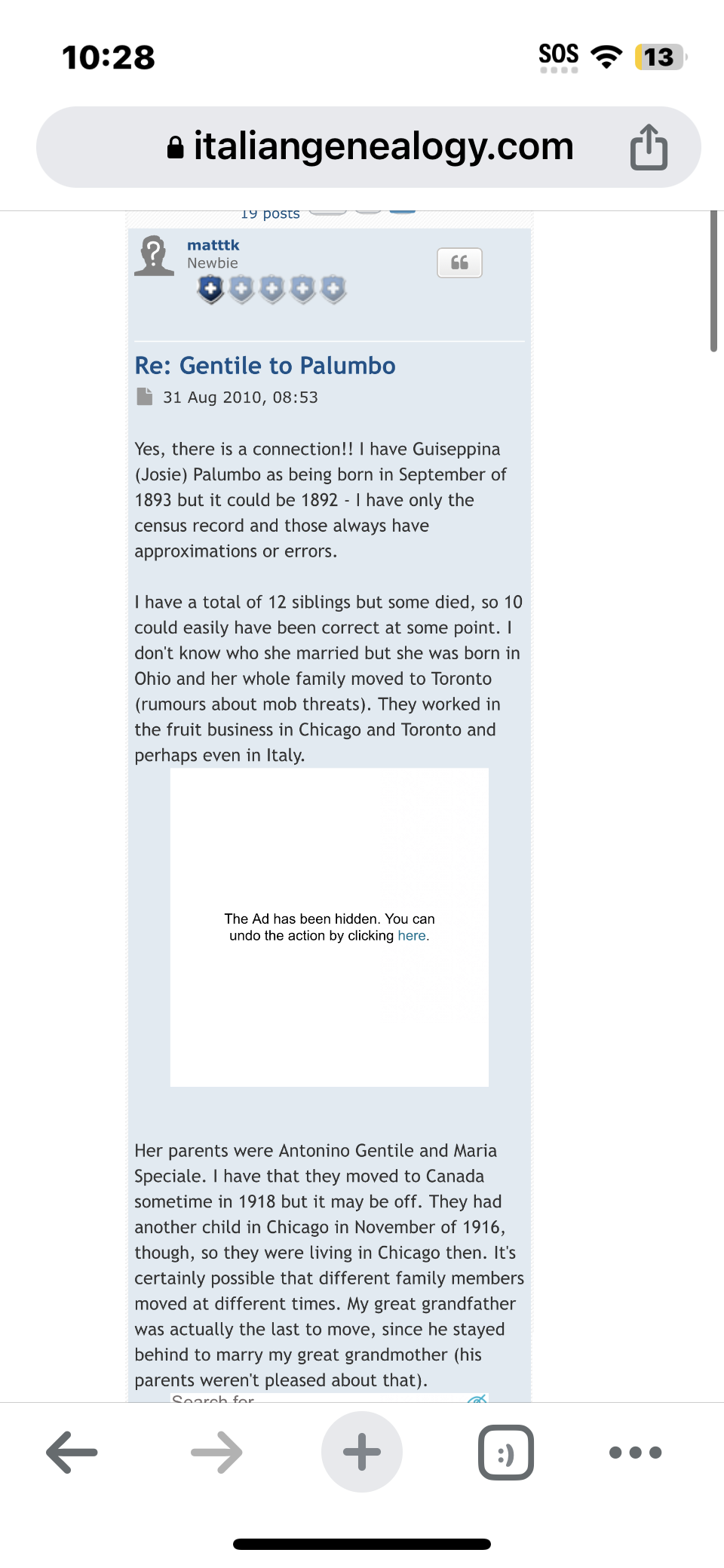






- PolackTony
- Filthy Few
- Posts: 5829
- Joined: Thu May 28, 2020 10:54 am
- Location: NYC/Chicago
Re: Toronto/Windsor
There were a bunch of Palumbos from Tèrmini in Chicago, including a number with the compound surname Gentile Palumbo. Many were involved in the produce industry, of course. Produce merchant Giuseppe Gentile Palumbo was an important man in the Italian community in Chicago around 1910, leading parades and such. The Termitani in Chicago were extremely influential in business, politics, and in Italian social life in Chicago, founding important fraternal organizations such as the famous Unione Siciliana, the Trinacria Fratellanza Siciliana, and the Società Imera Croce Bianca, as well as the Mano Bianca Society that was organized to suppress “black hand” extortionists. The Termitani were also almost certainly instrumental in founding the mafia in Chicago, with one of the earliest likely mafia murders in the 1880s involving produce peddlers from Tèrmini Imerese. I know that Zucchi argues in his book that the Termitano domination of the produce market in Toronto was due at least in part to their strong sense of solidarity. This was very much evident for them in Chicago as well.
In 1930, Termitano Chicago produce commission merchant Francesco Palumbo was wounded along with his friend Antonino Cosentino, also of Tèrmini, in a sawed-off shotgun attack. They told police that it was a robbery, but LE doubted their story and Cosentino’s family seems to have been involved in criminal activity. The shooting occurred during the height of hostilities between the Capone and Aiello factions in the Chicago mafia, so it’s possible that it was related.
In 1930, Termitano Chicago produce commission merchant Francesco Palumbo was wounded along with his friend Antonino Cosentino, also of Tèrmini, in a sawed-off shotgun attack. They told police that it was a robbery, but LE doubted their story and Cosentino’s family seems to have been involved in criminal activity. The shooting occurred during the height of hostilities between the Capone and Aiello factions in the Chicago mafia, so it’s possible that it was related.
"Hey, hey, hey — this is America, baby! Survival of the fittest.”
Re: Toronto/Windsor
Outside of the 'ndrangheta, the members in Canada are made members of mafia Families headquartered elsewhere. The mafia at its traditional core is a network of families and not just rackets, you are 100% right, but its primary activity isn't narcotics, it's everything they do. To mafiosi, there is no separation between who they are in the mafia and who they are in life. It's why an accountant / politician like Gagliano can be a member of the Bonanno Family -- he has to keep it quiet because he's part of a corrupt secret society, but there is no true "double life" in the mind of a mafia member, everything he does makes him what he is and is internally consistent.CabriniGreen wrote: ↑Sat Jul 01, 2023 1:56 amThis is a highly interesting post. I just recently replied to a post by Stubbs, that the Sicilians are a network of families, not just rackets. That it's based on families from Catollica and Siculiana, and the primary economic activity was narcotics.antimafia wrote: ↑Fri Jun 30, 2023 9:52 am Ah, okay. Having interacted in the Greater Toronto Area with many pachinesi and termitani in Italian-Canadian and Sicilian-Canadian cultural and business-professional organizations, I haven't encountered individuals with ancestry from either comune expressing contempt for the other group or for Sicilians with provenance from elsewhere, nor have I witnessed individuals putting on airs because of their particular ancestry. An antimafia stance comes through loud and clear from everyone I've met.
Below is part of what Lee Lamothe posted back on Dec. 1, 2006, 1:17 am, on Rick Porrello's old crime forum on AmericanMafia.com. Lamothe is referring to the Project Colisée bust that happened 9 days earlier.
The thirty in Toronto weren't touched by the Montreal project yet. The "crews" are actually relationships bound either by blood and marriage -- in the case of the Cammileris -- or by drug trafficking associations -- in the case of the Genua/Arcuris. In spite of what's been said recently in the media Toronto does have at least four Sicilian cells -- there seems to be a great effort on the part of people -- including so-called journalists -- to suggest Toronto isn't up to the task. Actually the Toronto Sicilians -- many of them from Trapani and Cattolica -- were deeply into the French and Pizza Connection cases and these guys are still around and are, I can tell you, tough old bastards.
Original link (no longer operational, nor archived on Wayback Machine): http://cybermessageboard.fatcow.com/rpo ... .php?t=155
Given that Lamothe was such a mob groupie and was obsessed with determining a criminal's formal mafia affilation -- this was before he started tending more and more to his wheelchair-bound wife, who was also a journalist -- I wonder whether today he would admit or clarify that individuals like Giacinto Arcuri, Peter Scarcella, and Antonino Cammalleri were "freelancers," as Anna Sergi was told in the last year by law enforcement here in Canada. One of my interpretations of this term "freelancer" -- maybe posters can reach out to her for her take -- is that 1. there have been Italian-Canadians in the Greater Toronto Area who have indicated they are part of the mafia when in fact they aren't (this behaviour is possible in Quebec too); and 2. law-enforcement agencies, true-crime writers, and organized-crime reporters have sometimes asserted that individuals are in the mafia who are not.
The relationships that individuals like Arcuri, Scarcella, and Cammalleri had to actual mafia members need to be carefully scrutinized but not embellished for the purpose of ascribing mafia membership to the former as well. In the case of Scarcella, you also have to look at how he seemed at times to be collaborating more often with the GTA-based Commissos of the Siderno Group than with Sicilian-Canadians or Sicilians in Ontario and Quebec.
Also interesting these Toronto Sicilians. Caruana people? Rizzuto people? A combo of both? Are they extensions of an existing group in Sicily? Or do they just have origins in Sicily, but a wholly newly formed thing?
Sergi wrote a paper that B. went into a little on mafia hybridization and Mafia " Brands" being appropriated by Italian criminals in certain territories where no mafia group established an absence of competition. In fact I forget exactly all of her reasons for this type of criminal behavior, I gotta go back and read..
I'm one of the cynics when it comes to "new organizations" and "mafia hybrids". What gets called a hybrid organization from the outside is just the network -- Calabrians, Sicilians, and others with their own groups co-mingle and it doesn't mean their individual groups change or become one. Members of the 'ndrangheta and Camorra can become Cosa Nostra members but their groups don't hybridize, they just become Cosa Nostra members and the network expands. Same for the idea of "new" Families forming -- if the "sixth Family" idea was true, then who recognized them? Rarely do mafia members try to form their own Families without permission and when they do, they are often left unrecognized and their place in the network weakens. We know recognition is still a factor in modern Canada with membership, as Todaro and the Luppinos agreed they didn't have to recognize a couple of Caruana-Cuntreras even though they had been formally introduced as "friends of ours", so you can infer the formation of a Family is still subject to this.
Something that gets lost in the Canada discussions is how small the membership is in Cattolica Eraclea and Siculiana. Sicilian Families, especially in Agrigento, are extremely small by North American standards. In 1993, Italian authorities said there were six affiliati of the Cattolica Eraclea Family and thirteen affiliati of Siculiana. This may not have been all of the members but it wasn't a fraction either and membership is by no means a given even for well-connected relatives. Some of the Cattolicensi and Siculianesi in Canada have been made with the Bonannos, Caracas, or the original Sicilian Families but I believe a lot of the mafia figures in this circle in Canada may be associates of those groups and it takes nothing away from them as participants in the network, it's just a detail worth mentioning if you're interested in the formalities of Cosa Nostra. There is an assumption sometimes that many of the Sicilians in Canada who weren't members of an American group must be members of the Sicilian mafia but there isn't supporting evidence for it in most cases and they are still beholden to the mafia regardless.
Re: Toronto/Windsor
Going back to Toronto, it is significant that Termini Imerese and Vita had such a strong presence in the early Italian colonies of Toronto. Not because most people from those towns were mafia members or associates but because colonies of those compaesani were likely to bring the mafia network with them. Termitani could be confusing to criminology-minded researchers because they often represented the upper crust of the Alta Mafia -- businessmen, professionals, and politicians were as much part of the mafia there as anything else and just about every Termitano colony in the US was a major node in the Palermitan mafia network. An upper class Termitano businessman is as likely to have been a Cosa Nostra member as an arch-criminal, if not more.